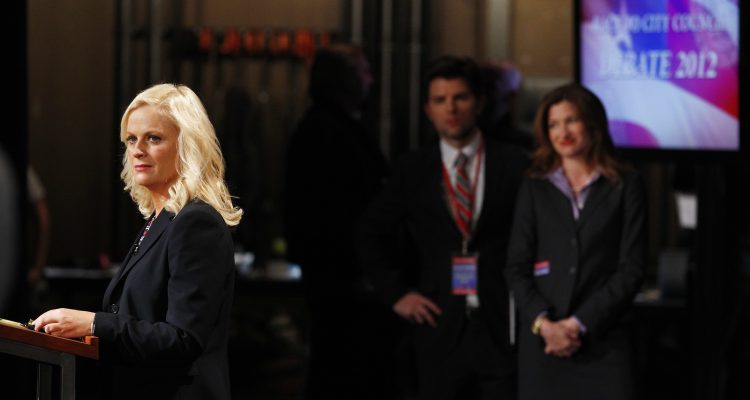As Barack Obama and John McCain battled to win the U.S. presidency in 2008, the dynamic started to feel familiar. And after a while, it began to become clear why: that match-up was more than a little reminiscent of a fictional presidential race from a few years earlier, in the sixth and seventh season of “The West Wing.”
The final years of Aaron Sorkin’s beloved show saw a bright, handsome young Democrat senator Matt Santos (Jimmy Smits) face off against older, maverick, quasi-socially liberal Republican Arnold Vinick (Alan Alda). Though their characters were different in some respects —unlike Obama, Santos was a veteran, whereas Vinick, unlike McCain, wasn’t— the dynamic between the two and the arguments they were having proved to be oddly reminiscent of that between Obama and McCain.
READ MORE: Despots, Demagogues & Dictators: 10 Films To Prepare You For The Rise Of Donald Trump
This year, it’s a very different (and far more terrifying) race for the White House between Hillary Clinton and Donald Trump. But it too has an obvious pop culture forerunner that eerily predicted, or to some extent drew on, a recent storyline from a politically themed show. And it’s not “House Of Cards” or “Veep,” two shows explicitly set in the corridors of power in Washington DC. It’s beloved NBC sitcom “Parks & Recreation.”
It’s been barely eighteen months since ‘Parks & Rec’ finished its seven-year run, but the show already feels like it’s firmly settled as an all-time great TV comedy. Created by Greg Daniels, of “The Office” and “King Of The Hill,” with his ‘Office’ protege Michael Schur, the show was conceived at an interesting time in politics, when Obama was on the verge of being elected and when the financial collapse was wreaking havoc worldwide, with the series intending to do for local government what the earlier show had done for the private sector.
Focused on the titular department in Pawnee, Indiana, and Deputy Director Leslie Knope (Amy Poehler, who had also played Clinton on “SNL“) in particular, the show was unusual in putting a warm face on the usually much-mocked local government archetype. “The idea was to say this is a really Byzantine world and it’s a really frustrating world,” Schur would later tell Uproxx, “and it would be fun to put a very optimistic kind of can-do spirit type person in the middle of that, and show one person’s attempt to make a difference in this small-or-medium type town.”
Like “The West Wing,” the show was a sort of love letter to public service, catching a brief moment of optimism in the “Hope and Change” age of Obama, but despite the occasional nods or jokes about recent events —there was a government shutdown, for instance— it never quite felt of its moment, in the same way that Sorkin’s show was more a reaction to the Clinton years than it was to the Bush presidency. But as we’ve learned over recent months, it served much better as a show presaging the Hillary Clinton/Trump era.

Various pundits from both the political and pop culture spheres have been pointing out the similarities all year, but the parallels really became clearest at last week’s presidential debate, as Clinton and Trump shared a stage and a split screen for the first time. Just like the “The West Wing,” ‘Parks & Rec” eventually did a long election arc in its fourth season, revolving around Leslie’s campaign for City Council, pitting her against Bobby Newport, the wealthy, feckless scion of the candy company-owning family that dominates the town, played by Paul Rudd.
The delightful, handsome Rudd wouldn’t ordinarily be associated with Trump, but while Bobby is a lot more presentable and genial than the Orange Overlord, the similarities in many respects are obvious. He’s a man born into money who wants to be elected because he thinks it’ll make his dad love him, he’s seemingly unable to feel empathy (“Why are you guys smiling? I feel bad,” he says), and he feels utterly entitled at every point (“I want it. Gimme it. Gimme it. Gimme it. Gimme the election,” he pleads with Leslie at one stage). He even, as Trump did during the debate, gets annoyed that Leslie’s campaign have used his own words against him in campaign ads and often seemingly wants to not lose more than he actually wants to have the job.
And yet up against Leslie, a public servant from top to bottom, he feels like a populist candidate and leads the polls comfortably throughout (even despite a blip fixed by the hiring of a top Washington campaign manager played by Kathryn Hahn, evoking the Trump turn-around after Kellyanne Conway took over his campaign). Leslie struggles to connect with voters (with a disastrous bowling evening that’s meant to be make her seem relatable more or less failing to do that), and has to go through a few scandals, including her own Birther scandal.
Newport goes into the debate as the presumed winner, because, as Hahn’s character says, “Expectations are crazy low. If he puts two sentences together without crying, the press will say he’s doing ‘surprisingly well,’” a sentiment expressed about Trump by more than one commentator before last Tuesday. He leads for most of the debate, despite a shaky command of the issues (“I guess my thoughts on abortion are…you know, let’s just all have a good time”), batting away any attacks with an attempt to take the higher ground with an effective dig: “You’re supposed to be this positive person, Leslie.”
But in a closing statement, Leslie pulls it back keeping the focus on the issues, while still pinpointing Newport’s selfishness and standing by her political principles. “If I seem too passionate, it’s because I care. If I come on too strong, it’s because I feel strongly.” It even wins Newport over (“Holy shit, Leslie, that was awesome!,” he exclaims), and she goes on to win the election.

